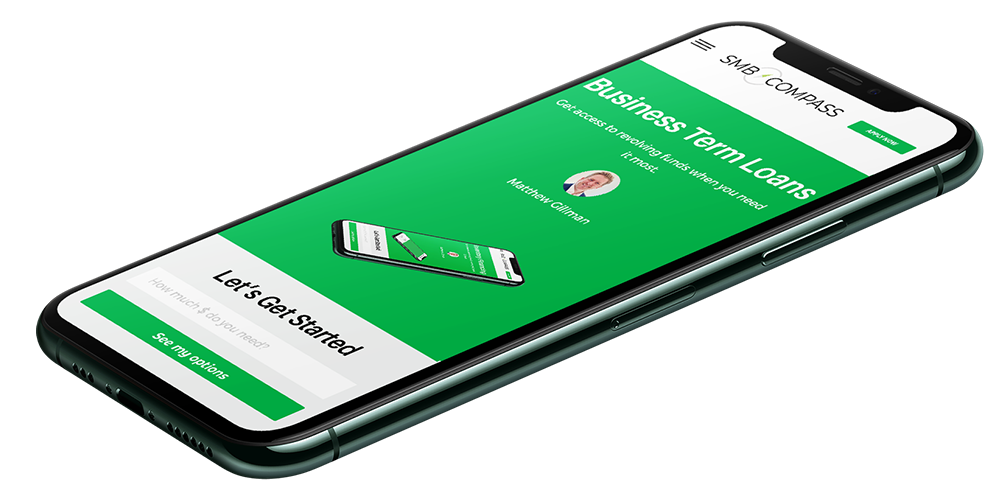Table of Contents
What are Business Term Loans?
A business term loan is a type of traditional business loan where the borrowing business receives a lump sum upfront, which they then pay back in monthly increments over a specific term as specified in the loan agreement. Usually, repayment periods for business term loans can range from a few months to ten or more years, depending on the stability and structure of the borrowing business, their credit strength, and their expense needs. Depending on the lender, term loans may have a fixed interest rate or variable interest rates, and pledging collateral may afford businesses with longer terms and lower rates because the collateral offers security for the lender.
Term loans provide businesses of all sizes with the ability to borrow capital for most types of business expense purchases, which might have not been affordable while only relying on operating cash flow for working capital. Without term loans, many business owners would have trouble covering everyday working expenses, expanding their business by taking advantage of growth opportunities, paying for expensive equipment costs, or any number of costs that term loans can help cover and ease the burden. There are countless ways that business owners have utilized the different term loan programs available, and it is easier than ever to discover information online about how to apply for term financing, or how to qualify for it, and some websites even offer a term loan calculator to help business owners figure out specific problems like how to calculate payments on a short term business loan. One of our lending advisors can help business owners learn more about business term loan programs available and help to find the right program for any business.
What are the different types of Business Term Loans?
Whether you’re looking for long-term business loans, medium-term loans, short-term small business loans, or any other type of business term financing, it is important to first consider the different types of business term loans that are available for businesses.
There are five common types of term loans that are used most frequently by SMEs: small business bridge loans, multi-year term loans, SBA term loans, asset-based term loans, and equipment term loans. Depending on the funding amount needed, the length of time the funds will be repaid over, and the type of expense the funds will be utilized for, there are several factors that influence the type of business term loan that will work best for a given business.
A small business bridge loan is a specific type of business term loan that is designed to meet the immediate financing needs of businesses, while they wait for a more permanent type of financing to get approved. Bridge loans can be used to cover expenses might be covering unexpected circumstances that require funding, bridging cash flow gaps, or taking advantage of new business growth opportunities to capitalize on. Instead of a business owner relying on using their own personal money, or even worse, passing up on opportunities that might result in additional profit, business owners should consider applying for business bridge loans. One main benefit of this type of loan is that the underwriting and approval process has a quick turnaround and funds can typically be wired to the borrowing business within 24 hours of application. When applying for small business bridge loans, the most important thing for the borrowing business owner to consider and understand is that the cash flow forecasted in the near future will be able to support the term payments for the bridge loan. Because bridge loans are typically used for short durations of time, as they are only intended to bridge expense gaps, it is important to be certain the funds will be there for the payments.
The process to secure a bridge term loan is usually very simple. Compared to other types of business term loans, a bridge loan will be less cumbersome for a business. In recent times, there’s been an increase in access to lenders online. A majority of term loan lenders offer online applications and submissions. These easy, quick applications, require limited documentation, and the funds can be processed as quickly as one day. With this particular small business loan, the repayment periods are usually short, and payments can be made on a weekly, bi-monthly, or monthly basis. In some cases, business bridge loans can be fully amortizing and in other cases, the loan is structured as interest only. The specific details of the term agreements will be determined by the lender according to the characteristics of the borrowing business and their specific lending situation.
A multi-year term loan is one of the medium-term loans that typically has a repayment schedule over the course of two to five years. A term loan that amortizes over several years usually can offer business owners relatively low monthly payments and interest rates that will provide the business with better ongoing cash flow for their daily operations.
Often, in order to qualify for a multi-year term loan, a business must be able to demonstrate good business trade credit, good cash flow history, and the business owner will have to show stellar personal credit. The terms and conditions of a multi-year business term loan will depend on the overall strength that the borrowing business can demonstrate and the owner’s personal credit standing. The underwriting process will evaluate the enterprise risk for both the company and the business owner.
For the small business, the underwriting process will consider the operating history, business trade credit, the typical cash flow, demonstrated sales trends, deposit consistency, and other documentation to validate the potential for the borrowing business to support the term payments. The owner’s personal credit score will be reviewed. Additionally, the management biographies and background checks will be conducted. There is generally a need for the lender to understand the credibility of the owner and business.
Multi-year term loans are typically utilized in different kinds of industries where businesses sell their goods, products, or services to other businesses or also for industries where the businesses sell directly to consumers, unlike other types of loan options where the type of industry restricts the type of lending product available to borrowing businesses. Multi-year term loans are used by many businesses for a wide variety of expenses, as this type of business term loan has very limited restrictions or covenants that coincide with the lending product. This makes a multi-year business term loan a great fit for businesses with strong credit profiles.
The application process for multi-year term loans is much easier than applying for other types of small business loans, like Asset-Based or SBA loans. Although less paperwork and fewer requirements are needed when applying for a multi-year term loan, the financial information, tax return, and other documents that the small business provides for the lender to review will play a large role in determining the business’ eligibility.
SBA term loan programs offered by the Small Business Administration (SBA) are among the most popular types of small business loans SMEs usually apply for. SBA Loans were created with the intent to help small business owners gain easy access to small business loans that they otherwise won’t be able to quality without the SMall Business Administration (SBA) guarantee.
Several types of SBA loans exist for small business owners looking to address any type of business expense. The SBA loan programs come with high loan amounts with lower interest rates than conventional small business loans. Depending on the nature of the borrowing business and the type of expense the funds are needed for, there is an SBA program for most types of business expenses. From purchasing inventory or equipment, refinancing existing debt, purchasing real estate, or other general capital needs, Small Business Administration (SBA) loan programs can help small businesses cover the costs.
The biggest benefits of SBA Loans include: long payment terms, low interest rates, and large loan amounts available for small business owners.
When cash flow alone is not enough for a borrowing business to rely on when applying to qualify for a loan, lenders can also consider the business assets that the borrower has to offer to use as collateral to provide security and comfort for the lender. Asset-based term loans use collateral as the emphasis when considering financing business expenses. The terms and conditions for asset-based term loan programs will depend on the type of collateral that the borrowing business has to put up. Some examples of different types of business assets the lenders will typically consider for asset-based term loan programs are accounts receivable or invoices, inventory, equipment, real estate, intellectual property, or marketable securities.
Business assets like accounts receivables, inventories, equipment, and real estate are particularly valuable for the lenders and, therefore, provide the most security. If the borrowing business fails to pay back the funds according to the terms, the lender will need to liquidate the collateral. Not all types of collateral are easily liquidated. However, those that are less liquid can still be considered an additional backup for the loan. These are often called boot collateral as they will help in obtaining additional capital, but will often not be considered for the bulk of the borrowed funds.
Asset-based term loans are generally most appropriate for business-to-business (B2B) industries because these types of companies significantly have more collateral than most business-to-consumer (B2C) companies. For example, manufacturers often have large, valuable pieces of equipment and machinery that hold their value. Also, these types of companies have accounts receivables, inventory, and other types of materials, whereas a restaurant might only have furniture, fixtures, and equipment to offer as collateral.
The application process for asset-based lending programs is typically paperwork-intensive and will require the small business to have all of their financial information organized to ensure a smooth application process. Outside of the standard documentation for other types of business term loan programs, asset-based term loan applications will require a detailed list of the assets the borrowing business has to offer so that the lender will understand the collateral available to secure the funds borrowed. Additionally, it is not uncommon for lenders to conduct a field audit by either visiting or sending a representative to visit the business to evaluate the value of the business assets used for collateral.
Equipment term loans are a type of term loan that allows business owners to finance the entire cost of new or used equipment. Instead of buying the equipment outright, small business owners can utilize equipment loans to take advantage of the low monthly installments (plus interest rates). Once approved, the business will receive a lump sum which they can then use for the equipment purchase.
By making the required repayments over the course of the term of the loan, the business owner can ensure that there will be sufficient operating capital available for other expenses, preserving the health of their cash flow.
An equipment term loan can typically be structured as a business equipment loan or an equipment lease program. Both be used in virtually all industries. Whether the borrowing business is in a B2B or B2C industry, if the equipment is necessary for their operation, an equipment term loan can most likely provide the funds and flexibility to cover the costs to obtain the best equipment available.
The process to apply for equipment term loans differs depending on the cost of the equipment being purchased. For less expensive, “small ticket” equipment purchases, which are equipment expenses under $250,000, lenders will only need to review an online application, the invoice for the equipment purchase, and a credit report (specifically the credit score) for the borrowing business. Most of the time, there is no additional financial documentation required for equipment term loans less than $250,000. On the other hand, for more expensive, “big ticket” equipment purchases, which are equipment expenses over $250,000, most lenders will need to check a full financial document package to determine the eligibility for the borrowing business.
Ready to apply for Business Line of Credit?
What type of collateral is used for Business Term Loans?
When business owners are considering applying for a business term loan, in addition to working cash flow, the type of collateral that the business has to offer should be considered. Lenders will want to check to see if the borrowing business has a typical influx of sales or working capital to sustain payments, and if there is any reason to doubt that the borrower will be able to make their payments, lenders will especially want to see collateral that a business can offer to secure the funds.
Collateral is used by lenders to secure funds in the case that if a borrower fails to make payments on the terms that were agreed upon, the lender can use the collateral the borrower put up to repay the amount borrowed. If a borrowing business does not have the capital to sustain monthly payments but has highly valuable assets to be used as collateral, the business owner might be able to secure funding with a business term loan, despite low cash flow. Some examples of the most popular types of collateral considered by lenders are machinery and equipment, commercial real estate, and inventory.
Considered a hard asset, machinery and equipment are usually favorable assets for a business term lender to consider because this type of collateral typically holds their value for long periods of time. By taking the make, model, year, and condition of the equipment or machinery, lenders will be able to evaluate the value of each asset. Typically, advance rates or loan to value (LTV) for equipment or machinery can be up to 100% for new equipment and up to 75% of forced liquidation value for used equipment. Lenders are mostly concerned that in the event the borrowing business cannot continue to make payments, they will need to re-sell the equipment or machinery to secure the funds that were borrowed. By determining the amount that they could liquidate the assets for, the lender will determine how much they can capitalize on in the event of a default, which will set the terms for the business term loan.
Another type of hard asset is commercial real estate, which is a great form of collateral for term loans. While commercial properties are not quite as liquid as equipment, accounts receivable, or inventory, this type of asset still provides stable value for lenders to lend against. Commercial real estate lenders and banks typically will only provide the first mortgage for commercial properties, whereas non-bank or alternative lenders might provide second liens on commercial real estate loans.
If the pledged property that a borrowing business has available to put up for collateral is extremely valuable, commercial real estate works as a great asset to use as collateral for a business term loan. In the event that the borrowing business has major issues, the lender can gain control of the property from the borrowing business owner.
Inventory is a tangible asset that might be able to hold value for an operating business, however, it is not always considered as valuable by lenders as borrowing business owners might hope. Whereas the inventory might be valuable for the business owner, the lender might not place the same value on it. The type of inventory, the ease of liquidation, and the location of the inventory all play a major role in determining the advance rate or LTV that the inventory can provide for a business term loan. For example, a company that manufactures its own jewelry which they then hold as inventory might receive a 30% LTV from a lender, while the steel manufacturer that holds the raw steel as inventory might receive 65% LTV.
From a lender’s perspective, the faster and easier that they will be able to sell the inventory in the event of a default, the higher the value they will assign and the more money they will be able to offer the borrowing business. Depending on the specific type, in some cases, lenders will conduct field audits to assess the value of the inventory. By sending a representative to the location where the inventory is held, a more accurate value will be placed on the inventory to provide the maximum LTV amount.
Businesses often have a hard time qualifying for comprehensive business loans because of the lack of credit history. If you’re looking to improve or build credit, a business line of credit can help. Many lenders may work with businesses with credit scores as low as 580.
As long as you make timely payments and you don’t go over the credit limit, you can improve your credit score and boost your chances of qualifying for comprehensive loans in the future.
Like other types of loans, applying for a business line of credit puts you in contact with a manager that oversees your application. You’ll most likely be in touch with this person throughout the duration of your credit contract.
The regular correspondence between you and your loan manager will help build a business relationship that you might be able to leverage in the future. Anytime you need additional capital to cover business initiatives in the future – be it equipment, renovations, or raising the limit on your credit line – you can trust that your loan manager can help and make the process smoother.
What type of collateral is used for Business Line of Credit?
At AB Funding, we accept different types of collateral to secure your business term loan. The value of your collateral can help you qualify for higher loan limits, lower interest rates, and more liquidity. There are different types of collateral, but here are the top four ones that are commonly used by our clients:
We consider machinery and equipment as hard assets, which means they’re strong assets to use as collateral. To determine the value of your equipment, we will consider the make, model, year, and overall condition of your equipment. Generally, the loan to value (LTV) assigned to a piece of equipment is 60% of the forced liquidation value (FLV).
Accounts receivables (A/R receivable) are the money that your customers owe to your business after completing a sale. Lenders consider accounts receivables or invoices as collateral for multi-year term loans. We generally advance 70% to 95% of the total invoice value. For instance, if your invoices are valued at $100,000 and the advance rate is 85%, we will give you $85,000 upfront against your invoices.
The financing can be structured as a term loan or a line of credit. But businesses usually prefer the term loan structure since it’s easier for them to account for the required monthly repayments.
Another collateral we consider is inventory. To determine the value of your inventory, we check the location of the inventory, ease of liquidation, and the type of inventory. For example, a jewelry manufacturer may receive a 30% LTV, while steel manufacturers may get a 65% LTV. The lender’s main concern is the resale value of your collateral; the faster and easier they can sell it, the higher its value.
Lastly, purchase orders (PO) are one of the most common forms of collateral. A purchase order is a document made by your customer to authorize a business transaction with your company. It outlines the terms of the sale, including the payment terms, shipping dates, price, quantity, and more. Once you accept the purchase order, lenders can use it as collateral for your term loan. Generally, the LTV against purchase orders is between 30% to 40%. But once the purchase order is fulfilled, the PO becomes an invoice and you’re can advance the remaining percentage.
Ready to apply for Business Line of Credit?
Why Use Business Term Loans?
Business term loans are utilized by many business owners that need assistance with capital or other business expenses. Because of the range and flexibility of costs and restrictions, and the variety of different types of programs, there is a business term loan to fit the needs of most borrowing businesses. Some of the most common uses for business term loans are: business acquisition, equipment purchases, debt consolidation, working capital, inventory, real estate, and debt refinancing
Many business owners utilize business term loans in order to acquire new businesses. By using a business term loan to finance an acquisition, business owners can free up their funds for operating expenses and other costs. When using a business term loan for acquiring new or existing businesses, the primary characteristic that the lender will consider is the risk that the existing and new businesses will impose on the lender once the business owner is in control of the new ownership.
Instead of taking a blow to your cash reserves with expensive up-front purchases, many business owners utilize business term loans for equipment purchases. By capitalizing on business term loans for equipment or machinery purchases, business owners free up capital and other lines of credit for other expenses. Every business owner wants to maintain the highest level of state-of-the-art equipment for their business, but most of those purchases are extremely pricey. Business term loans provide one option to keep the best equipment without making large purchases all at once.
Many business owners utilize multiple financing options in order to cover their daily and annual operating expenses. Business term loans offer one solution to the overwhelming debt that can pile up quickly across multiple avenues. By utilizing business term loans to consolidate debt, business owners experience the ease of making one payment to the lender by refinancing their debt, rather than making multiple payments to multiple lenders.
One of the most common uses for business term loans is for working capital needs. Many small business owners need a boost in working capital, and term loans provide the best option by allowing business owners to put money in their bank account and making smaller, easier to manage, monthly (or weekly) repayments to cover the amount owed.
Businesses that experience high turnover of inventory often have trouble keeping up with the cash flow necessary to keep the shelves stocked. By using business term loans for inventory, business owners can make sure they have the inventory needed without expending all working capital on it.
Another common use for business term loans is for real estate purchases. By borrowing funds from a lender in order to purchase new real estate, business owners can ease the burden of the expense by making payments over the terms of the loan agreement, rather than making the large purchase upfront.
Ready to apply for Business Line of Credit?
What are the best industries for Business Term Loans?
Business term loans are industry-agnostic, meaning that they can be used for a variety of reasons across industries. A business term loan is a great option for business owners, whether they are in an industry that sells business-to-business, business-to-consumer, or business-to-government. With the range in flexibility and qualifications for business term loans, there is usually a business term loan product that can fit each borrower’s needs.
Ready to apply for Business Line of Credit?
What are Business Term Loan Rates?
There are many different types of term loans rates, and different loan products and packages will have different structures, rates, and terms. The specific details for business term loan rates will vary from lender to lender, and there are a number of factors that can influence the rates.
Lenders offer two types of interest rates for their term financing products: Fixed and variable interest rates. Fixed interest rates imply that the same interest rate will be charged for the loan throughout the term. Variable interest rates, on the other hand, could change overtime depending on how the economy is currently faring. In other words, your payments could change if the economy goes up or down.
We offer both fixed interest rates and variable rates for our term loan programs. However, the type of rate will vary depending on a number of factors, such as:
- Business trade history
- Profitability of the Borrowing Business
- Length of Time in Business
- Operating history
- Personal Credit Score of Business Owner
- Collateral available to secure the loan
- Subordinate or First Position
- Use of funds
- Length of term
- Quality of clients
What are the Rates for Business Term Loan?
Fixed interest rates are typically customary for business term financing. Because the interest rates don’t change overtime, your payments will remain the same for the duration of your loan (1 to 5 years or more). This makes it easier to figure out how much financing your company can afford and keep up with monthly payments until the loan is paid off.
Moreover, there are factors that identify business term loan interest rates. This includes:
- Credit Score
- Business Style
- Business years of operations
- Formal business documents
- Business financial status
- Collateral
Ready to apply for Business Line of Credit?





